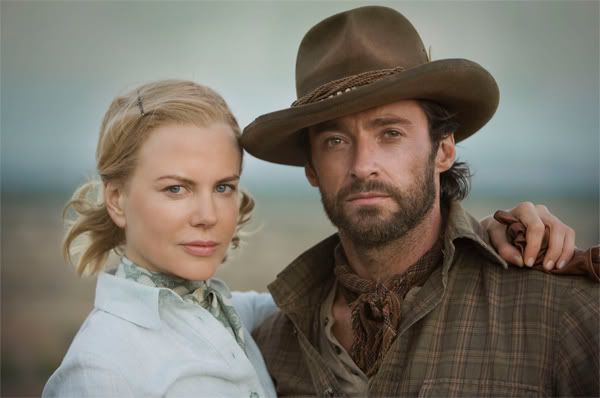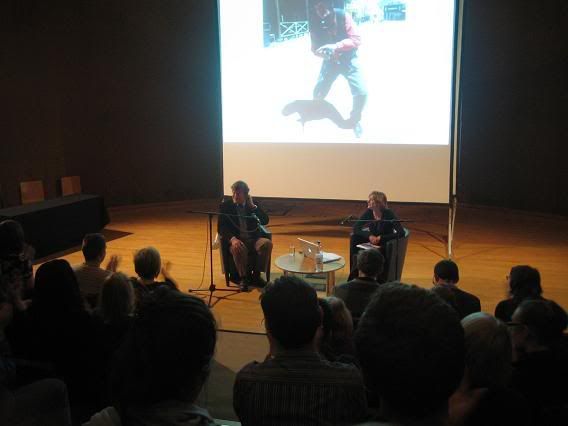Set just before WW2, Lady Sarah Ashley (Nicole Kidman) leaves England for Australia to her husband’s ranch and drive 1500 cattle across the outback to Darwin. Dressed in lace and pressed lined and carrying a parasol, it’s not long before she clashes with wild’n’dirty Australia.

The first part of the film is beautiful to look at but also uncomfortably camp; Baz is determined to pull you into ‘his’ world, abide by his rules and, as he said in one interview, have you “check your coat at the door.” The music is too loud, each movement has a touch of flamenco and the camera lunges from one scene to another in a way that doesn’t work as well as it did in Moulin Rouge. And people take prat falls while Nicole squeals in indignation every opportunity.
About half an hour in, there’s a very, very welcome shift and the story proper gets going.
Nicole Kidman gives her trademark to some eyes - ‘subtle’ and ‘nuanced’, to others - ‘wooden’ performance as the English toff who’s brought down a peg or two by the environment and transformed into a tough Sheila. Trust Australians to spin the Cinderella story so that she only becomes a princess when she gets rid of her finery and throws away the glass slipper. And what a prince she lands! One review I read had me in stitches with its snarky insistence on referring to Hugh Jackman as “Hugh Russell-Crowe-wasn’t-available Jackman” but this doesn’t do justice to his virile performance. Jackman is wonderful; he has the composure and silence about him of the young Clint Eastwood and…I’m going to stop there or you won’t take another word I say seriously…
Visually, the film is glorious from beginning to end. The breathtaking landscape is painted in super-real colour and everything that can gleam or shine does. We are given plenty of time to enjoy the almost Martian landscape and marvel at the boab trees.
There are many memorable scenes such as when a body falls into the river, the cattle drove, King George, the aborigine grandfather standing on one leg watching from high up which suffuse the movie with its unique and often plain Australian feel which must have the local tourist board rubbing its hands in glee.
At the same time, there’s much to recognise from regular westerns and Baz directs the exciting sequences of the cattle drove with panache giving many stuntmen the classic gig of their lives! The drove is unmistakably the highlight of the movie and I haven’t seen anything like this since Dances with Wolves. It brings the movie and the characters to earth and the story settles into that of little people with massive personalities leading out their intense lives against a brutal landscape and in a dangerous period in history.
The added Australian twist is the dark story of the mixed race Aboriginal children something which, I am ashamed to say, I knew very little about. It was the Australian government’s policy to forcibly remove children from their homes and ‘program the Aborigine out of them’. One of the main threads of the plot is Lady Ashley’s maternal attachment to young Nullah, played by Brandon Walters, whose performance is glowing.
I believe, that despite the self-righteous carping by some critics about the movie, where they say it’s too soft-focus, raising public awareness of these issues is of vital importance. David Gulpili who plays King George is the most famous actor of aboriginal descent; he starred in Walkabout all those years ago and his troubled circumstances to this day serve as a blot on the consciousness of white Europeans whose ancestors have neutered and almost obliterated so many indigenous races worldwide. It’s worth reading Germaine Greer’s article (preferably after you’ve seen the film) for an intellectual, pc, Australian perspective on this issue.
By twisting history, garbling geography and glossing over the appalling exploitation of Aboriginal workers, Baz Luhrmann's film Australia bears more relation to fairytale than fact, argues Germaine Greer
One reviewer said that Baz Luhrman knows very little about real history and more about film history – this is a fair point, the film is sprinkled with endless references to Gone with the Wind, the Wizard of Oz and probably Skippy too! I too know very little indeed about Australian history but I know a thing or two about watching movies; I assume, before the lights go down, that movies are there to entertain and I also expect any movie that has a ‘historical’ element will be twisted to fit the story. It’s not The Truth up there just because it’s bigger than life size and even if the director wants you to believe it is.
Yes, film-makers have enormous power to influence us as do advertising, the media and any political ranting you might be exposed to but we should all know better by now. Question everything – we have that freedom; use it. Baz makes damn clear that you know you’ve entered into the world of the unreal. I heard him talk about how nowadays we’re all too damn cynical and too damn clever for our own goods – there’s a time and a place, hang up your coat, put your feet up and munch on that popcorn and escape from the credit crunch and lack of daylight to chest hair, screen kisses, good guys and bad guys and shiny, shiny landscapes for a few hours. You can pop your cynical coat back on and google the plight of the aborigines once you get home.
